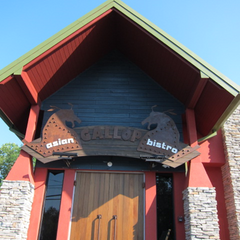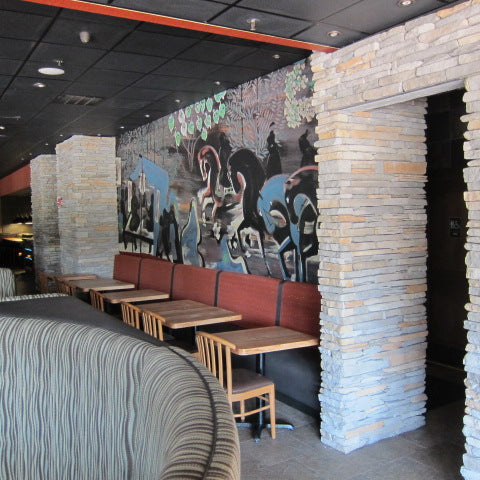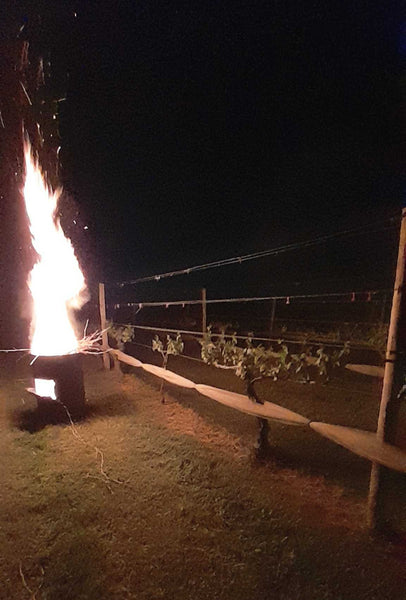Meet the Chefs: Jack Yang of Gallop Asian Bistro
A SYMPHONY OF FLAVORS: GALLOP BISTRO, 793 U.S. 202 N., BRIDGEWATER, N.J. (908) 210-9161.
Philip Glass is undeniably world-famous as the greatest composer of Minimalist and Classical music of the current period. A prodigy, Glass entered The University of Chicago at 15 years of age as a Mathematics and Philosophy major. Modernist music claimed him, and after a few years in Paris living a Bohemian life, he entered Juilliard to formally study composition. His output includes Operas, musical theatre pieces, 10 symphonies, 11 concertos, chamber music, sonatas, and film scores. It is, however, unknown if he enjoys Chinese Cuisine.
 What do Modernist Music, Philip Glass and the brilliant food and beautiful setting of Bridgewater’s “Gallop Asian Bistro” all have in common? The proprietor and artist Jack Yang.
What do Modernist Music, Philip Glass and the brilliant food and beautiful setting of Bridgewater’s “Gallop Asian Bistro” all have in common? The proprietor and artist Jack Yang.
It was this great Modernist musician who brought Jack Yang to the United States.
Our friend Jack Yang is the principal owner of Gallop Asian Bistro in Bridgewater. To those of you who haven’t been, Gallop is the fabulously beautiful Asian-Fusion restaurant occupying what had been a pancake house on Northbound Rte. 202, two miles South of the Somerville circle.
I recently sat with Jack to try to come to grips with the connection between Philip Glass and this great restaurant.
Q: O.K. Jack, I give up – how did Philip Glass lead to Gallop?
A: Not in a straight line for certain. Growing up in China, my passion was music. I studied at a Classical Chinese Conservatory, was exposed to Glass’s music and became convinced that his was the way of the future and the musical current I needed to follow. Although I was a passionate devotee, I realized that it was not possible to pursue Contemporary Modernist music in China. I was fortunate enough to earn a grant from the Brooklyn Conservatory and came to the United States to pursue my dream. I naively assumed that because Glass was American, living in New York, that Modernist music must be huge here. I planned and dreamed to make my future in this great Country composing Contemporary music. Only after I was here did I realize there was only one Philip Glass and not even he profited from the most avant garde of his work. If I was going to prosper, I needed to readjust my perspective.
Q: But how did learning that Modernist Music was not your future lead to white tablecloth Classical Asian dining?
A: Again the path was not straight forward. My cousin was a very successful businessman. Starting from a single location, he built the largest chain of Chinese restaurants in the country, Panda Express. You probably know, the concept is Chinese fast food with many locations in the food courts of regional shopping malls. One day my Cousin asked me if I was profiting. I confessed my failure to succeed and my doubts about my musical dreams. He urged me to come and work for him. I really didn’t know anything about business but determined to learn and succeed. I joined him. Within two years, I had obtained my own Panda Express franchise and was able to begin to succeed.
Q: But Panda Express is fast food, Gallop Asian Bistro is anything but fast food, how did this come to be?
A: You should realize that almost all Chinese men are taught to cook the classic dishes of their region. Knowing what classical Chinese food is, and realizing that Americans were generally only being served a poor shadow of real cooking, I saw an opportunity. You can probably visit a thousand Chinese restaurants in Central New Jersey. Invariably if you look closely you will see they are fast food places. The chefs are not educated in hygiene, not taught classic techniques, not schooled in consistency. The restaurants are most often in older strip malls with low rents, cracked linoleum floors, filthy in the back and the food dosed with MSG and other salts. My cousin’s genius in Panda Express was in remedying the hygiene issues and siting his restaurants in high-rent Malls. Then he focused Panda Express on consistency. But like the other fast food restaurants, he had to focus on simple dishes in an emotionally barren Mall landscape. It is not classical Chinese cooking, It is an American/Chinese stew. Good, but that concept leaves no room for truly great.
When I first came to America, I first thought that Americans just must not like real Chinese food. I soon realized, that most Americans had just never experienced Classical Chinese cuisine
I was convinced that there was a real potential to bring great cooking, and an upscale dining room to market. I conceived of Gallop Asian Bistro and with my partners, resolved to create a gourmet authentic Asian-Fusion restaurant with the highest standards. We insist of the freshest of ingredients. Each order is created at the time of dining. I try to personally see and approve each dish before it is served. I insist on the highest standards of hygiene. I oversee the continuing education of my chefs.
Q: I understand your commitment to quality ingredients, fresh produce, classical techniques and flavors and consistency, but does all of that really require a setting as beautiful and comfortable as you have built here at Gallop?
A: Yes. I needed to embrace Chinese culture to create authentic Chinese food. Authentic food requires patience in the kitchen. The food, the dishes are meant to be enjoyed intellectually as well as through the senses.  A great Chinese meal, as is true of all great cuisines, is not just to fill the stomach. Great food, like great wine, is meant to be savored and discussed. The meal is when family and friends come together. When important issues are decided in China, it occurs around the table. When friendship and family values are shared, it occurs over meals. In America, life moves so quickly, it is difficult to capture the serenity and peace needed for fine dining. We can’t do that in a loud Mall or grimy strip center. We needed to create an oasis of peace. The environment of Gallop is designed to promote peace and tranquility even during meals cut short by the pace of life. I am careful with the background music as well as with the perfection of each dish. The culture of Gallop is the final differentiator with lesser Asian-themed restaurants. Our culture is authentic, beautiful and delicious.
A great Chinese meal, as is true of all great cuisines, is not just to fill the stomach. Great food, like great wine, is meant to be savored and discussed. The meal is when family and friends come together. When important issues are decided in China, it occurs around the table. When friendship and family values are shared, it occurs over meals. In America, life moves so quickly, it is difficult to capture the serenity and peace needed for fine dining. We can’t do that in a loud Mall or grimy strip center. We needed to create an oasis of peace. The environment of Gallop is designed to promote peace and tranquility even during meals cut short by the pace of life. I am careful with the background music as well as with the perfection of each dish. The culture of Gallop is the final differentiator with lesser Asian-themed restaurants. Our culture is authentic, beautiful and delicious.
Q: You recently brought into Gallop a general manager, not Chinese, not trained in Classical Chinese Cuisine, who does not even speak Chinese, how does that advance the Gallop plan?
A: (Laughing)…To answer that question you only need to look around. My clientele is almost 80% Asian. Part of that is their appreciation of the authentic nature of the cooking. Part of that is their embrace of patience- sharing food and time with friends and family. But we are in Central New Jersey. I always understood that my initial clientele would be significantly Asian, that was inevitable. But at the same time my concept was to reach out to Americans and to introduce them to the highest levels of Asian dining. I am now American. My children are American. I needed to sharpen my focus to reach and satisfy my American friends and clients. Hiring Ed Scott was the first step in reaching that native market.
Q: How did you pick Ed?
A: Ed Scott brings to Gallop exceptional skills and the attitude I require. He has been in the restaurant business for more than thirty years, as a Chef, a Wine Steward, a Server and as an entrepreneur. He may not be yet experienced with Asian Cuisine, but, more importantly, he knows great food, great service and the ins and outs of doing business in a high-end white tablecloth environment. More than these skills and experience, however, Ed Scott shares my enthusiasm to create something great and unique and ultimately lasting. Like any great Chef, Musician or other artist, he has the passion to be brilliant.
[A Note from the Unionville Wine Impressario: When I first agreed to write about the great restaurants offering Unionville Wines, I made it clear that lacking restaurant and cooking experience, I would not be comfortable attempting to actually critique the food offered. This restraint is particularly true with Asian cuisine where, other than my experience with fast food Chinese and occasional Thai offerings, my experience is zero. I do, however, need to remark that although I lack standards with which to judge as ambitious an undertaking as is Gallop, this restaurant and the food are brilliant. The taste, the colors, the presentation, the ambiance of this restaurant is unlike anything else I have experienced. This is the type of restaurant wherein Unionville wines can really shine. Another word: although the food and ambiance are entirely worlds apart from most, the value, fair, even generous, pricing is also shocking. Visit soon.]
1 Response
Leave a comment
Comments will be approved before showing up.
Also in Unionville Grapevine

The Best Wines are the Ones You Fight For
We picked from 5am that day until a little past midnight, almost 19 hours of harvesting. The pick was only interrupted for bathroom breaks, pizza, and eventually some beers to keep morale high. I think the high morale beer was Miller High Life, although the details are fuzzy and it would only have been selected ironically. It was the most tenacious day I can recall in the field here. We picked nearly 10 tons from three different vineyards, finishing with the Pheasant Hill Chardonnay. We saran wrapped the bins during transport and weighing back at the winery as Ophelia's first raindrops splashed down just after midnight.



Karen
April 19, 2015
I have been there, the food was good and the people there are nice, go to see you will like it.